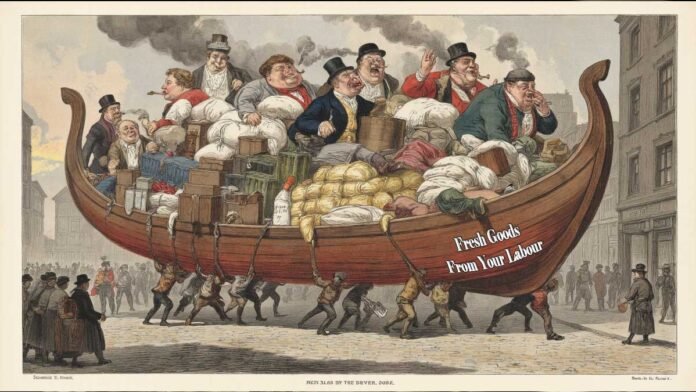If Trump’s Tariffs Have Shown Us Anything, It’s That We Must Rebuild or Rot
For decades, tariffs have been dismissed as crude relics of a bygone era, blunt instruments unsuited to our sophisticated global economy. But after thirty years of offshoring, deindustrialisation, and environmental devastation, it’s time to dust them off. Because the real obscenity isn’t a tariff on foreign goods, it’s a trade system built on exploitation, child labour, and national suicide disguised as economic progress.
It’s time we stopped calling that “free trade” and started calling it what it is: a race to the bottom that’s destroying both planet and prosperity.
Tariffs remind us of a simple truth: real security means making the things we use, not shipping them from halfway around the world.
They said global trade would lift all boats; instead, it sank our shipyards and floated their yachts
The Great Lie of Cheap Goods

We were promised that outsourcing manufacturing to the lowest bidder would deliver cheaper products to British consumers. It was a lie from the start, one that’s cost us everything.
That £25 toaster made in a Chinese factory? It costs £4 to produce. The remaining £21 doesn’t go to you in savings, it goes straight into corporate coffers. Meanwhile, the ceramics factories of Stoke-on-Trent closed down. The textile mills of Lancashire fell silent. Even the bricks we use to build our homes are now shipped from India, made by workers, including children, paid pennies per day.
Globalisation gave us £5 T-shirts and £50 gas bills, what a deal
The UK is the number one country in the world for brick importation, according to data from the Massachusetts Institute of Technology’s Observatory of Economic Complexity. More than 500m bricks were imported in 2022, leading to carbon emissions of 288,190 tonnes.
British industrial towns became wastelands. Communities were hollowed out. Entire skill bases were lost. All to chase a fantasy of “global efficiency” that only ever benefited shareholders and corporate executives.
The savings never reached your pocket. The profits never trickled down. The only thing that trickled was the slow, steady erosion of Britain’s capacity to make anything at all.
Trump’s Uncomfortable Truth
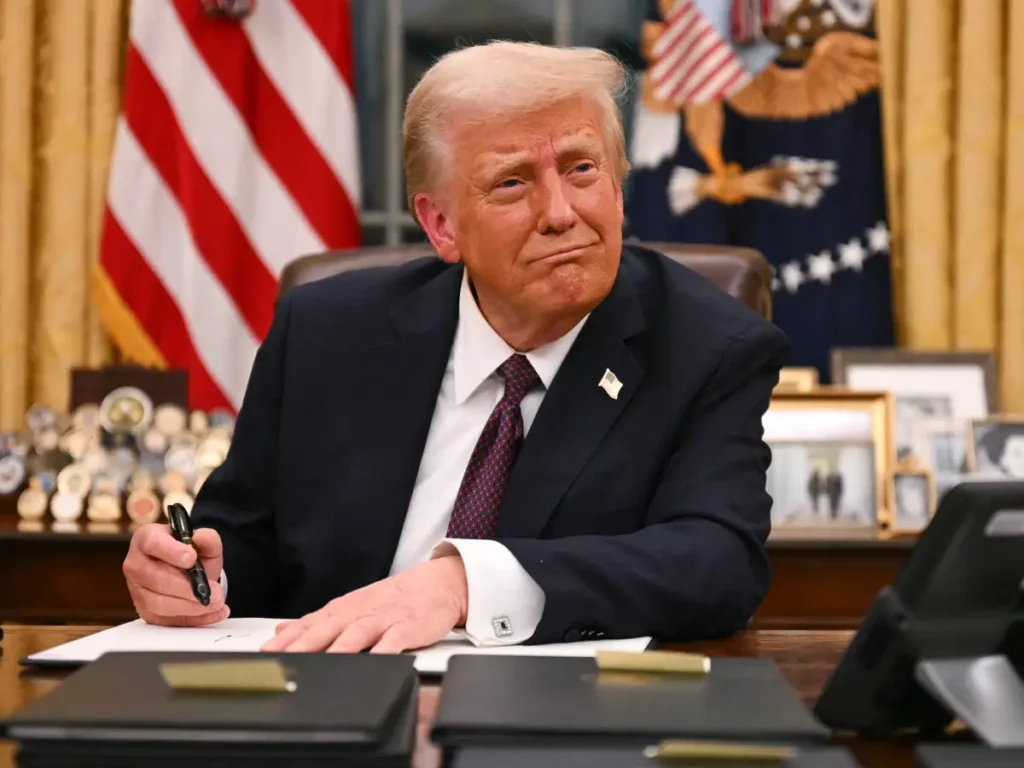
Say what you want about Donald Trump, and there’s plenty to say, but his tariffs achieved something that decades of polite neoliberal consensus refused to contemplate: they reopened the debate about national production.
His execution may be chaotic, riddled with corporate giveaways, and often counterproductive. But the principle is sound: “if you want industry, protect it. If you want jobs, fight for them. If you want sovereignty, manufacture it yourself.”
While British politicians wrung their hands about “disrupting global supply chains,” Trump slapped tariffs on steel, aluminium, and semiconductors. American steel production increased. Chip manufacturing returned. Jobs came back. Not all of them, not perfectly, but enough to prove a point: nations that make things have power. Nations that don’t make things become vassals.
The Environmental Case for Tariffs
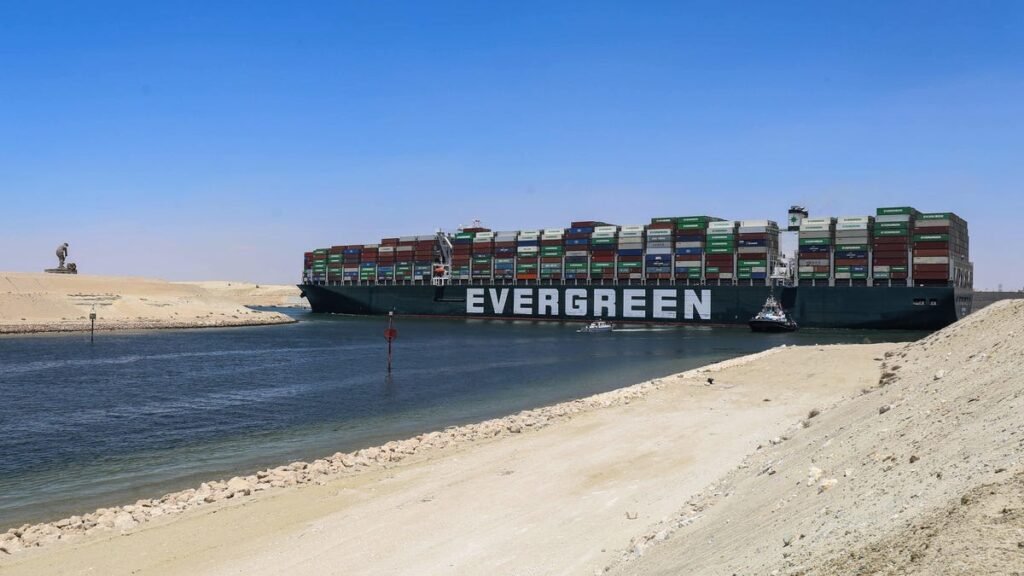
Here’s what the free-trade fanatics don’t want you to consider: shipping a t-shirt from Bangladesh to Birmingham isn’t just economically insane, it’s environmentally catastrophic.
Every product we import instead of make carries a carbon footprint that’s killing our future. Container ships burning the dirtiest fuel imaginable. Planes crisscrossing continents with goods that could be produced locally. Supply chains so complex that a simple disruption, like a ship stuck in the Suez Canal, can paralyse entire industries.
Tariffs aren’t just about protecting jobs, they’re about protecting the planet. Make locally, sell locally, consume responsibly. It’s not protectionism; it’s survival.
What Britain Could Build
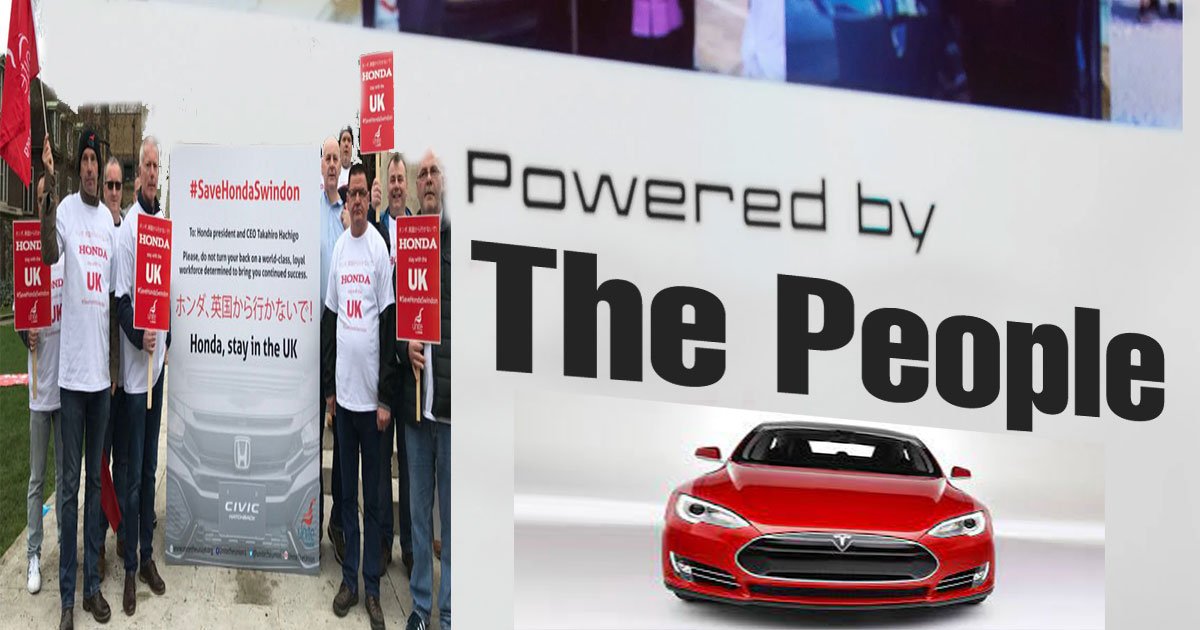
Post-Brexit Britain faced a choice: become a workshop again or become a glorified warehouse for foreign goods. Instead, we got dithering governments, corporate sellouts, and half-baked trade deals that locked in our dependency.
But imagine what we could build with a proper industrial strategy backed by smart tariffs:
- Green Steel: Using hydrogen instead of coal, powered by renewable energy, producing the materials for offshore wind farms and nuclear plants.
- Electric Vehicle Manufacturing: Not just assembling foreign parts, but building the batteries, motors, and electronics that power the future.
- Semiconductor Production: The chips that run everything from phones to fighter jets, currently monopolised by Taiwan and South Korea.
- Precision Manufacturing: Robots and automation that don’t eliminate jobs but enhance them, paired with worker ownership and profit-sharing.
- Advanced Ceramics and Materials: The high-tech stuff that enables everything from medical implants to space exploration.
None of this happens by accident. It requires planning, investment, and yes, protection from unfair competition built on child labour and environmental destruction.
The Road Not Taken
This isn’t fantasy. Britain had this vision before, and threw it away.
On October 1st, 1963, Harold Wilson stood before the Labour Party conference in Scarborough and outlined a socialist plan for the scientific revolution. “The Britain that is going to be forged in the white heat of this revolution,” he declared, “will be no place for restrictive practices or for outdated methods on either side of industry.”
Wilson understood what we’ve forgotten: that technological advancement without social purpose becomes exploitation, but social purpose without technological capability becomes irrelevance. He warned that Russia was “training 10 to 11 times as many scientists and technologists” as Britain. He called for producing more scientists, retaining more scientists, and making better use of our scientists.
We ignored him. While Wilson dreamed of harnessing technology for socialism, we chose the City of London’s financial casino instead. Today, 41% of degrees awarded in China are in science and engineering, compared to just 22% in the UK. We’re still losing the race Wilson identified sixty years ago.
But Wilson’s vision wasn’t just about numbers, it was about purpose. Technology serving people, not just profit. Innovation directed by democratic planning, not market whims. The “white heat” burning away both capitalist exploitation and trade union conservatism to forge something new.
That’s what tariffs and industrial strategy can deliver today: not a return to the past, but Wilson’s road not taken, a Britain where scientific revolution serves socialist ends.
A Progressive Tariff Strategy
Tariffs shouldn’t just protect, they should discipline. Any company wanting tariff protection should be required to:
- Reinvest profits in domestic production
- Pay union wages
- Meet environmental standards
- Provide worker training and advancement
- Accept democratic oversight of their operations
Pair tariffs with carbon border adjustments that penalise countries with lax environmental standards. Add labour duties that protect against exploitation. Use the revenue to fund industrial development banks, green infrastructure, and worker retraining.
This isn’t Trump’s crude nationalism, it’s smart industrial policy that serves workers, communities, and the planet.
The Automation Advantage

Critics will say we can’t compete with cheap foreign labour. They’re right, and they’re missing the point.
We shouldn’t compete with child workers in Bangladeshi sweatshops. We should leapfrog them entirely. Modern manufacturing isn’t about cheap hands, it’s about smart machines, innovative processes, and skilled technicians. Germany’s industrial success isn’t built on low wages; it’s built on high productivity, advanced automation, and worker cooperation.
Bring on the robots. Bring on precision manufacturing. Bring on lean production and continuous innovation. But pair it with public investment, fair wages, and worker ownership. Automation should liberate labour, not eliminate it.
The Tools We Need
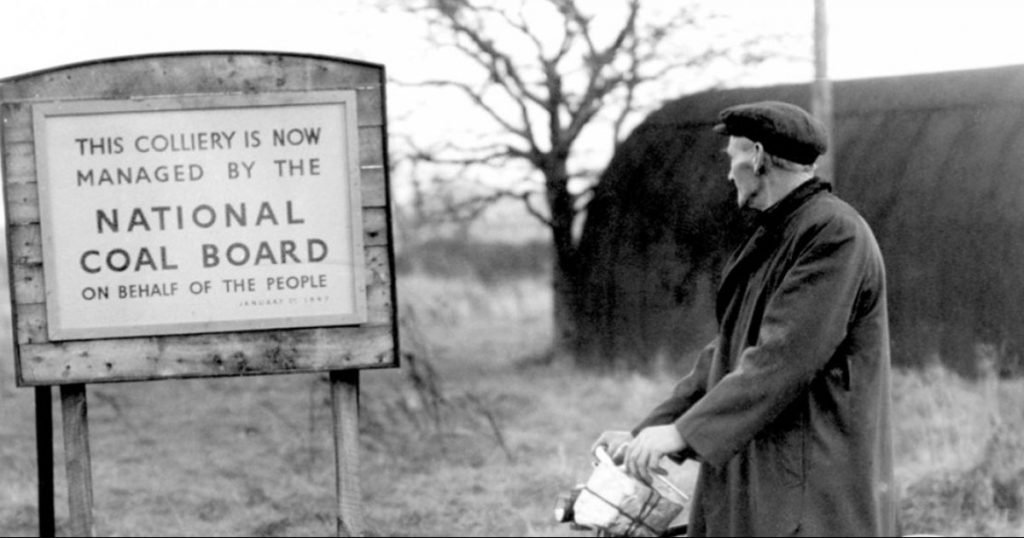
This vision requires something else: taking back control of our national resources. For decades, our energy, water, and utilities have been plundered by foreign corporations and private equity vultures who extract profits while letting infrastructure crumble. Every kilowatt, every litre, every essential service should serve British communities, not overseas shareholders.
Nationalisation isn’t ideological nostalgia, it’s strategic necessity. Meanwhile, we should be backing British industrial champions like Rolls Royce’s small modular nuclear reactors, which could power our manufacturing renaissance while exporting clean energy technology worldwide. The state that controls its resources and champions its innovators is the state that controls its destiny.
But here’s the uncomfortable truth: these things alone won’t save us. Without the right framework, they risk creating a domestic oligarchy instead of a foreign one. Success hinges on solving three critical problems that most protectionist rhetoric conveniently ignores.
Problem One: Who Captures the Gains?
Trump’s tariffs brought back some American jobs, but without wage controls or antitrust action, corporations pocketed most of the gains. Steel prices rose 40%, but workers saw minimal pay increases. The profits stayed at the top.
We can’t repeat that mistake. Any British firm benefiting from tariff protection must accept:
Sectoral Bargaining: Unions setting wages industry-wide, not company by company negotiations that corporations can divide and conquer.
Mandatory Reinvestment: At least 20% of profits must be ploughed back into domestic production, training, and R&D, not shareholder payouts.
Public Equity Stakes: Use tariff revenue to buy shares in reshored firms, ensuring the public captures the upside of protection. Norway’s sovereign wealth fund shows how this works.
Windfall Taxes: If companies exploit protection to gouge consumers, they face penalty taxes that fund further industrial development.
Problem Two: Rebuilding State Capacity
Britain doesn’t just lack industry, lacks the state capacity to rebuild it. After forty years of outsourcing expertise to consultancies and dismantling industrial planning, Whitehall couldn’t competently procure PPE, let alone orchestrate a manufacturing renaissance.
Compare that to Germany’s Fraunhofer Institutes, which bridge academic research and industrial application. Or South Korea’s state banks, which disciplined the chaebols by tying credit to export performance. Or China’s ruthless competence in forcing tech transfers and building domestic champions.
We need a National Enterprise Board 2.0 with real teeth:
Co-Investment Powers: Taking stakes in strategic sectors like batteries, semiconductors, and green steel.
Open-Book Contracting: No more Carillion-style outsourcing scams, public contracts mean public oversight.
Technical Education Revolution: Germany’s dual education model produces the skilled technicians modern manufacturing requires.
Local Content Requirements: Like Biden’s Build America rules, offshore wind farms, rail projects, and EV production must use 60% UK-made components.
Problem Three: Managing the Transition
Slapping 50% tariffs on everything overnight would trigger inflation, shortages, and retaliation. Working families can’t bear the cost of sudden adjustment.
The transition must be smart and staged:
Start Strategic: Begin with sectors where Britain still has latent capacity, ceramics, speciality steel, precision manufacturing. Build success stories before expanding.
Carbon Border Adjustments: Penalise imports from environmental laggards while recycling revenue into green subsidies for domestic producers.
Worker Protection: Anyone displaced by trade shifts gets retraining and 80% pay protection for two years. No one left behind.
Currency Policy: A deliberate pound strategy to help exporters without crushing import-dependent households, potentially including capital controls to prevent speculation.
Global Coalition Building: Go alone and the EU and US will crush us. Build a “Climate and Labour Bloc” with like-minded nations to impose joint carbon and labour tariffs.
The Missing Pieces
Even with these tools, massive obstacles remain. The City of London’s financial dominance over industry. A political class addicted to “services-led growth.” A broken state that’s forgotten how to build anything.
But that’s exactly why we need revolutionary industrial strategy, not just tariffs with good intentions. We need to claw back ownership, discipline capital, and win.
The Choice Ahead
The question isn’t whether tariffs are good or bad in some abstract economic sense. The question is simple: do we want to keep surrendering our industrial base to the lowest bidder, or do we want to build again, with steel, silicon, and solidarity?
Do we want to remain dependent on supply chains that exploit children and destroy the environment? Or do we want to create an economy that works for British workers, British communities, and the British future?
Because if we don’t start making things again, someone else will. And they’ll own the future we could have built.
The tools are there. The need is urgent. The only question is whether we have the courage to use them.
Rebuild or rot. That is the only question for Westminster…
Support Independent Journalism Today
Our unwavering dedication is to provide you with unbiased news, diverse perspectives, and insightful opinions. We're on a mission to ensure that those in positions of power are held accountable for their actions, but we can't do it alone. Labour Heartlands is primarily funded by me, Paul Knaggs, and by the generous contributions of readers like you. Your donations keep us going and help us uphold the principles of independent journalism. Join us in our quest for truth, transparency, and accountability – donate today and be a part of our mission!
Like everyone else, we're facing challenges, and we need your help to stay online and continue providing crucial journalism. Every contribution, no matter how small, goes a long way in helping us thrive. By becoming one of our donors, you become a vital part of our mission to uncover the truth and uphold the values of democracy.
While we maintain our independence from political affiliations, we stand united against corruption, injustice, and the erosion of free speech, truth, and democracy. We believe in the power of accurate information in a democracy, and we consider facts non-negotiable.
Your support, no matter the amount, can make a significant impact. Together, we can make a difference and continue our journey toward a more informed and just society.
Thank you for supporting Labour Heartlands
